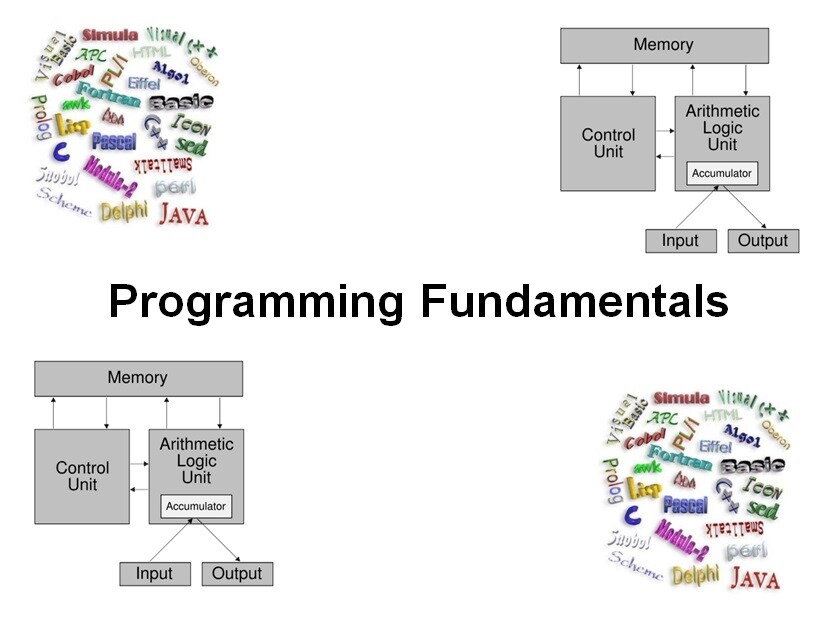-
Learning by doing
-
Trainers with practical experience
-
Classroom training
-
Detailed course material
-
Clear content description
-
Tailormade content possible
-
Training that proceeds
-
Small groups
In the course Programming for Beginners the basics of programming are discussed using some programming language. The language is not central in this course, but you simply need a language to program in.
The course starts with an explanation of the methodology of structured programming. Attention is paid to writing programs in source code and translating this code with compiler and linker into executable binary code.
The participants also learn how to formulate a problem in Nassi Schneiderman diagrams and Data Flow diagrams. Simple problems are analyzed and converted into instructions in the programming language.
Then attention is paid to statements, operators, variables, constants, arrays and data types in programming languages.
And control flow constructs, which are present in every programming language, are treated such as branching with if, then, else, select, case and iterations with while, for, do while, break and continue.
Code reuse is addressed in the treatment of functions. Both calling functions from a library and writing functions your own functions are discussed. Also the difference between call-by value and call-by reference is explained.
Also pointers are covered that can be used to point in memory and to walk through the memory.
The course ends with an introduction to object oriented programming. After completing the course, participants are able to write small programs that solve programming problems. They will not be aware of all the ins and outs of the language because that is not the purpose of this course.
The course Programming Fundamentals is designed for individuals who want to learn the principles of programming and to apply their programming knowledge in any language on any platform.
To participate in this course no specific prior knowledge is required. General knowledge of and experience with computers is desirable.
The theory is discussed on the basis of presentation slides. Demos are used to clarify the concepts. The C language is used as an example language. The theory is interspersed with exercises in which participants solve simple programming problems.
Participants receive an official certificate Programming Fundamentals after successful completion of the course.

Module 1 : Intro Programming |
Module 2 : Structure Diagrams |
Module 3 : Variables and Data Types |
|
Programming Languages Language Syntax Levels of Programming Language Generations Unstructured Programming Procedural Programming Object Oriented Programming Compiled Language C Compiling and Linking Creating Executables Intermediate Language Java Compiler and Interpreter Compiling and Running Java Programs Script Language Python Running Python Scripts |
Software Development Phases Structured Programming Pseudo Code Program Structure Diagrams PSD Instructions PSD Selection Diagrams Multiple Selection Diagrams Iteration Diagrams While and For Iteration Logical Operations in PSD’s Input and Output I/O in PSD Average PSD File I/O in PSD Functions in PSD |
Variables Data Types Assignment Instructions Variable Declaration Variable Initialization Java Data Types JavaScript Data Types PHP Data Types Identifiers Identifiers Examples Constants Strong Typing Weak Typing Dynamic Typing Comments |
Module 4 : Control Flow |
Module 5 : Operators |
Module 6 : Arrays |
|
Control Structures if Statement if else Statement if else Examples Multiple Selections Nested if Statements switch case Statement Iteration Statements for Loop while and do..while Loop break and continue |
What is an Operator? JavaScript Operators Arithmetic Operators Logical Operators Comparison Operators Assignment Operators String Operators Bitwise Operators Other Operators Operator Precedence Expressions |
What are Arrays? Creating Arrays Initializing Arrays Accessing Arrays Array Indexes Array length Processing with for Processing with for each Multidimensional Arrays Associative Arrays JavaScript Associative Arrays PHP |
Module 7 : Functions |
Module 8 : Pointers |
Module 9 : Classes and Objects |
|
Library Functions User Defined Functions Calling Functions Advantages of Functions Function Prototype Function Definition Passing Parameters Local and Global Variables Return Statement Types of Calls Recursion |
Pointers Variables and Addresses Pointer Declaration Initializing Pointers Pointers to Variables Pointer Dereferencing Pointer Assignment Call by Value and by Reference Pointers and Arrays Address Arithmetic Arrays in Function Calls |
Class Definition Encapsulation Access Modifiers Constructors Creating Objects Fields and Methods Instance variables Class variables Using Objects Object References Object Destruction |
